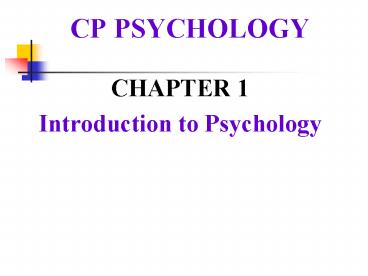CP PSYCHOLOGY - PowerPoint PPT Presentation
1 / 14
Title: CP PSYCHOLOGY
1
CP PSYCHOLOGY
- CHAPTER 1
- Introduction to Psychology
2
Assessing The Truth and Improving Critical
Thinking (1Q1)
- Four basic approaches to determine truth
- 1) INTUITION We rely on non-rational,
non-conscious abilities, our gut feeling - 2) AUTHORITY We rely on someone elses
knowledge and expertise - 3) RATIONALISM (Logic) We rely on the rules of
logic or on reason - 4) EMPIRICISM (Experiment) We rely on
objective observation (ex. scientific research)
3
Assessing The Truth and Improving Critical
Thinking (1Q1)
- Use intuition to generate a hypothesis
- Use authority when reviewing existing research
findings - Use logic and empiricism when designing
experiments and interpreting results - Cultural differences exist in the value placed on
authority vs. empiricism - - Traditional societies place more emphasis on
authority - - Technological societies like US and Western
Europe place emphasis on empiricism, often
ignoring logic, authority, and intuition
4
Intro to Human Behavior (1Q2)
- Human behavior is most often driven by physical
and mental states - Physiological (physical) motivation comes from
physical needs such as hunger, thirst, sleep, sex
etc. - Cognitive (mental) motivation comes from our
ability to think and reason things out - Why Study Psychology?
- - Because psychology provides useful insight
into behavior - - Psychology has practical uses
- Ex. mnemonic devices (memory aids)
5
Intro to Human Behavior (1Q2)
- Psychology is the scientific study of behavior
and mental processes - Scientific study (Empiricism) of behavior reduces
chance of reaching false conclusions - Hypothesis educated guess, stating what is
expected in a way it can be proved or disproved
6
Intro to Human Behavior (1Q2)
- Scientific Method
- Identify a problem
- Form a hypothesis
- Collect data (experiment)
- Analyze data
- Reach conclusion
7
Intro to Human Behavior (1Q2)
- Psychologists have four main goals
- 1.To Describe behavior
- 2. To Explain behavior
- 3. To Predict behavior
- 4. To Control behavior
- Psychologists who study human/animal behavior are
doing Basic Science - Psychologists who use what we know to solve psych
problems are doing Applied Science
8
Brief History of Psychology (1Q3)
Study of human behavior began with ancient Greek
philosophers Greek philosophers relied on
observation as a means of knowing the world
around them Believed people controlled by their
minds, rather than being controlled by the gods.
9
Brief History of Psychology (1Q3)
Copernicus and Galileo (1500s) first used the
concept of experimentation through observation By
17th century idea that mind/body are separate
(Dualism) emerged Monists believe mind and body
are one Modern psychology evolved as a science
using methods of observation, logic, math, and
experimentation
10
Brief History of Psychology (1Q3)
Psychology was established as a separate field
of study in Germany (1879) by Wilhelm
Wundt Wundt established first Psych Lab to
research the workings of the mind through
Structuralism Wundt used Introspection
(self-observation) to collect data and map out
structure of thoughts William James, early
American psych pioneer (1890), believed in
Functionalism of the mind - Activities of the
mind (thinking, feeling) serve one
function to help us survive as a species
11
Brief History of Psychology (1Q3)
Psychologists later studied unconscious mental
processes through Psychoanalysis Sigmund Freud
(1865-1939) felt that unconscious motivations
control behavior - First used psychoanalytic
methods such as free association and dream
analysis Free Association may use inkblot
tests - His views of the unconscious
remains a powerful yet controversial influence
today
12
Brief History of Psychology (1Q4)
Psychology also studies individual differences
Sir Francis Galton, 19th century British
scientist studied how heredity influences
behavior - Galton tested human abilities
characteristics leading to todays
personality/intelligence testing Ivan Pavlov
(Russian physiologist) - studied
stimulus-response type learning in dogs
13
Brief History of Psychology (1Q4)
John B. Watson started Behaviorism (1924) Felt
only observable behaviors were important -
Based on a system of rewards and punishments
(reinforcement) to elicit behavior BF Skinner
popularized behaviorism in Walden Two (1948)
Book about a utopia society based on behaviorist
methods - Skinner developed a teaching
machine, the forerunner of computer assisted
instruction
14
Brief History of Psychology (1Q4)
Humanists, unlike behaviorists, believe human
mind is able to influence/change the world -
Emphasize free will of people to choose
destiny Abraham Maslow and Carl Rogers are the
most notable Humanists Cognitive Psychologists
believe cognitive (mental) processes govern
behavior,(mental interpretation) Psychology as a
Profession Psychologists are not Psychiatrists
Psychiatrists medical doctors who prescribe
medicine to treat psychological
disorders Clinical and Counseling psychology are
most popular, often called psychotherapists
Other types of psychologists include Social,
Developmental, Educational, Experimental,































